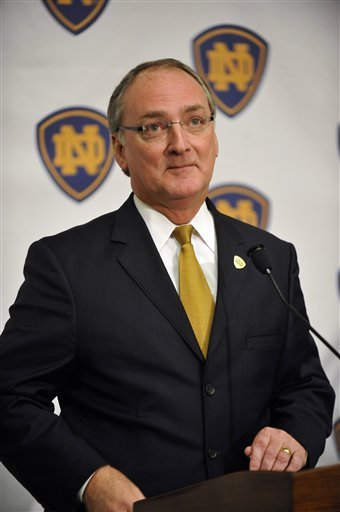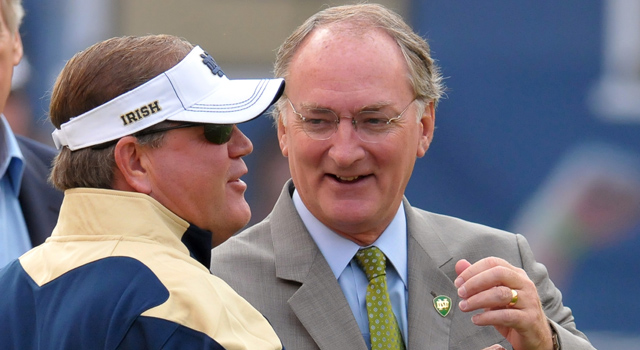College football’s national signing day has dominated the headlines this past week, what with production values surrounding the commitment process skyrocketing and more people than ever interested in high school recruiting. There are massive staffs at universities responsible for the recruiting period that is currently concluding, usually composed of individuals who fall under the football program’s umbrella. These groups are hugely influential in how a school’s haul gets ranked by the national media, and coaches criss-cross the nation racking up thousands of frequent-flyer miles (that is, if they were flying commercially) to ensure their signing day goes off without hitch.
 However, after what seems to be a stellar turn-out of high school talent this past signing day, Notre Dame’s head coach Brian Kelly complimented not only his new recruiting coordinator but also his AD, Jack Swarbrick, (pictured right) for the success of the Irish’s top-ten ranked incoming class. Swarbrick, who says he “enjoys” meeting and helping vet potential Irish student-athletes, was limited in his role recruiting for the football team due to travel obligations. Nevertheless, his input was clearly valued by Kelly during the vital but difficult period leading up to student commitments.
However, after what seems to be a stellar turn-out of high school talent this past signing day, Notre Dame’s head coach Brian Kelly complimented not only his new recruiting coordinator but also his AD, Jack Swarbrick, (pictured right) for the success of the Irish’s top-ten ranked incoming class. Swarbrick, who says he “enjoys” meeting and helping vet potential Irish student-athletes, was limited in his role recruiting for the football team due to travel obligations. Nevertheless, his input was clearly valued by Kelly during the vital but difficult period leading up to student commitments.
Swarbrick’s participation in helping build the best Fighting Irish team possible leads me to wonder why more ADs don’t take an active role in the recruiting processes of their teams. One obstacle is obvious: being a college AD takes a tremendous amount of time before adding extra recruiting obligations. The volume and scope of responsibilities for an AD could easily prevent him/her from having the opportunity to meet with potential players or their parents. Swarbrick alluded to as much after Kelly mentioned his participation.
A second hindrance to an AD taking an active role in the recruiting process is push-back from the coaching staff. It takes a confident, open-minded individual to allow his/her boss to play a part in the job the staff is undertaking. AD participation could undoubtedly lead to unwelcome suggestions or even mandatory alterations coming from above, and coaches, especially of football, have a tendency to be protective of their processes and policies.
Perhaps a final reason we don’t see ADs getting more involved in recruiting is because of a lack of expertise in a sport. As Forbes recently observed, college ADs are changing. What was previously a position for coaches who understood sports and the dynamics of coaching, being the leader of an athletic department has transformed into a significantly different type of job. A position responsible for budgets well into the millions of dollars, fundraising with alumni, public relations, and human resources, the modern AD must have the knowledge of a businessman as much as athletic coach, making him/her perhaps valuable for interviewing a player, but certainly not equipped to discuss how a recruit might be used on the field.
According to Brian Kelly, Notre Dame’s football team directly benefited from having AD Jack Swarbrick assist with recruiting. However, don’t expect this to become the standard across the country. While it has been shown time and again by NCAA violations that some programs would benefit from greater administrative involvement and oversight into recruiting, as things currently stand, Swarbrick might remain the exception rather than the norm.



Leave a Reply
You must be logged in to post a comment.